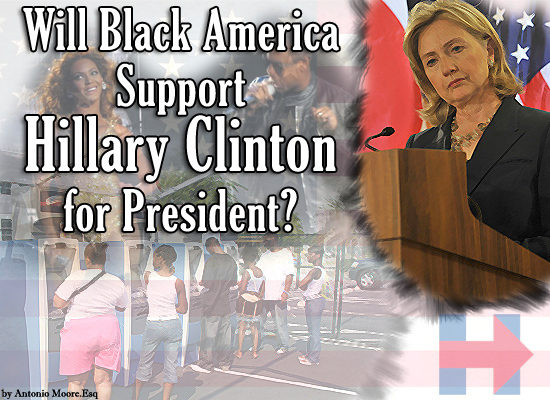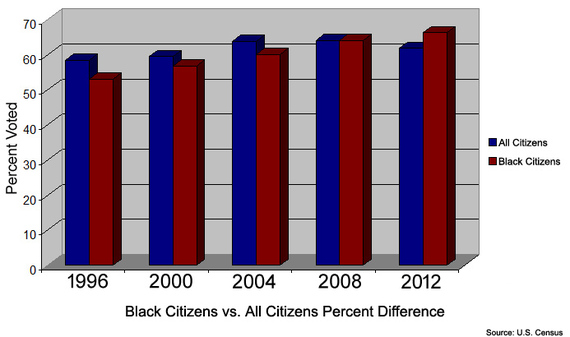
The fanfare around Hillary Clinton's nomination has been at a fervor for months. Unquestionably she stands as the likely next Democratic presidential nominee, and the first woman to have a legitimate shot at the White House. Yet, the question remains: Will Black America turn out in support? Will she have the same support African Americans gave President Barack Obama in 2008 or even in 2012?
According to the article "Voter Turnout Increases by 5 Million in 2008 Presidential Election" published by the U.S. Census:
About 131 million people reported voting in the 2008 U.S. presidential election, an increase of five million from 2004, according to a new table package released today by the U.S. Census Bureau. The increase included about two million more Black voters... Blacks had the highest turnout rate among 18- to 24-year-old voters -- 55 percent, an eight percent increase from 2004. Looking at voter turnout by race and Hispanic origin, non-Hispanic whites (66 percent) and Blacks (65 percent) had the highest levels in the November 2008 election.
ABC polls also noted in 2008, 96 percent of the African Americans that turned out were expected to vote for President Barack Obama. These Black votes came at a low political cost; little if no direct promises to fulfill were made to Black America. The Black votes were simply based on the faith that President Barack Obama's presence in the White House meant more for Black people than any singular legislative action. In general regardless of his lack of stance on the campaign trail, there was a belief amongst African Americans he would have their interest at heart once elected. This type of support allowed now President Obama to focus on many other voting demographic groups during his campaigns. The issues of groups that would require a commitment to policy to sway their vote at election time were addressed directly. Support of gay marriage, a push for a comprehensive immigration reform and a stand on women's rights were all part of a broad platform.
Black America will hardly make the same blind commitment to Clinton. As African Americans felt the impact of the last several years, their position on economic inequality, mass incarceration and voter suppression hardened. All of which must be addressed directly if Clinton is to get Black support in the coming election. As stated by veteran political strategist Charles D. Ellison in his recent article on TheRoot.com, Hillary will "need a solid 90 percent-plus share of the black vote to win. President Obama received 95 percent of it in 2008, 93 percent in 2012." But it is turnout that will likely play the key role in 2016, once at the voter box as a block Black Americans tend to vote Democratic.
Despite people's memory of President Bill Clinton's popularity in the African American community, the black turnout in 1996 for President Bill Clinton's second election, was a low of 53 percent. If this repeats itself in 2016, Hillary will be in for a long night next November.
Several questions are left that will directly affect this question of Black voter support for Hillary in the coming election. Namely, will Black celebrities and will Black women give Hillary the same energetic support they gave President Obama?
In 2012 Jay Z filmed the below message of support for President Obama's campaign, with the glitz of a music video rather than a political ad. The short video set the internet ablaze, speaking to President Obama's character as a change agent. Despite being filled with little policy substance, it carried the flashiness needed to catapult President Obama forward with Black America's youth.
Black celebrities from Will I Am to John Legend filmed music videos of his speeches. The campaigns run by Obama were social media messages targeted at Black America's emotion, rather than a play to their logic through a commitment to policy. Can Clinton do the same? Will her presence stir the same effect emotionally for a Black America drained by the last several recession filled years impact on their communities across the nation? African Americans suffer from unemployment rates that in some cities are as high as 50 percent for working age African American men. In addition, American economic inequality has reached all-time highs, with particularly devastating effects on black communities.
The other question is how Black women will respond to Hillary Clinton as the first woman with a legitimate chance to be president. Will gender have a similar impact on their turnout and support in 2016, as race did in the last two elections? In a piece on Ebony.com, a premier black women's magazine's website, titled "Is Hillary 'Ready' for Black Voters?", author April Reign wrote:
There are a substantial number of fences that "Hillary for America" must mend with the Black community if Clinton is to earn Black votes, going back to the contentious primary between her and then-Senator Obama in 2007... Clinton touted herself as the better candidate to win "hard-working Americans, white Americans," all but abandoning her attempts to win the votes of Blacks once then-Senator Obama established himself as a strong contender in 2008... Although she may be found to be the most qualified Democrat in 2016, Hillary Clinton will still have to make amends with the Black community before winning our enthusiastic support and our votes.
This amends will likely need to come in the form of a commitment to a policy agenda that focuses on the aforementioned needs, and more, to excite the Democratic black political base. From economics to criminal justice, Black issues that need to be addressed are abundant. The test will be to do so without drawing the ire of the white working class.
The Week.com wrote the article "Why White Women Will Play Kingmaker in 2016." In it the author details the impact of the white female vote on Clinton's campaign:
Democrats can win without white women, but they will win much easier with them, particularly if they swing just a few percent of the vote... In 2014, 58 percent of white women said they'd vote for Clinton in a matchup with named Republicans.
But it is Black women, as the head of households that at times haven't voted traditionally, that could decide Hillary's fate in this election. In the 2012 election, due to a number of factors "Black women were almost nine points more likely to vote than Black men." The Pew Research Center's analysis of the 2008 election stated:
Much of the surge in Black voter participation in 2008 was driven by increased participation among Black women and younger voters. The voter turnout rate among eligible Black female voters increased 5.1 percentage points, from 63.7 percent in 2004 to 68.8 percent in 2008. Overall, among all racial, ethnic and gender groups, Black women had the highest voter turnout rate in November's election -- a first.
While this will all play out in the year to come, one thing we do know is that Black America will have to be a focus for the Hillary Clinton presidential campaign if she hopes to win the White House in 2016.
------------------------------
Antonio Moore is a Los Angeles based entertainment attorney with several celebrity clients. He is also producer of the documentary on the Iran Contra & Crack Cocaine Epidemic "Freeway: Crack in the System presented by Al Jazeera"

